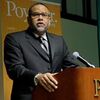Caleb Maupin, a journalist and political analyst, joins us to talk about proposed domestic terrorism laws. A coalition composed of dozens of human rights organizations have written a letter to Congress voicing their opposition to any expansion of domestic terrorism laws. The group argues, "We must meet the challenge of addressing white nationalist and far-right militia violence without causing further harm to communities already disproportionately impacted by the criminal legal system." Caleb discusses whether the Capitol riot will be used as an excuse for an authoritarian crackdown.
Dr. Emmitt Riley, a political scientist and assistant professor of Africana Studies at DePauw University, joins us to discuss domestic politics. US Senate Minority Leader Mitch McConnell (R-KY) has signaled he is ready to accept the parameters of a power-sharing deal proposed by Senate Majority Leader Chuck Schumer (D-NY). Meanwhile, the impeachment process moves forward as Democrats plan to focus on the protesters’ reaction to remarks made by former US President Donald Trump.
Laith Marouf, a broadcaster and journalist based in Beirut, Lebanon, joins us to talk about the potential for a US return to the nuclear deal with Iran. Israeli officials are once again indicating they will attack Iran if the US returns to the 2015 agreement. Also, while the Biden team is seeking discussions with Iran, they are simultaneously expanding their military presence in Saudi Arabia.
Alexander Mercouris, editor-in-chief at TheDuran.com and host of "The Duran" on YouTube, returns to The Critical Hour to discuss the investigation into the origin of the Russiagate operation. Recently declassified information reveals that Kevin Clinesmith, the FBI lawyer who pled guilty to knowingly misleading the FISA court, was not alone in his actions. Also, we now know that exculpatory information regarding former Trump campaign staffer Carter Page was deliberately withheld from the FISA process.
Kathy Kelly, an American peace activist noted as one of the founding members of Voices in the Wilderness, and who serves as co-coordinator for Voices for Creative Nonviolence, returns to The Critical Hour to talk about Afghanistan. Current speculation is that US President Joe Biden will back off Trump’s May deadline for a complete withdrawal of troops. Additionally, it is believed this change may blow up the current peace negotiations between the Taliban and the Afghan government.
Dr. Jack Rasmus, a professor in the economics and politics departments at St. Mary's College of California, joins us to discuss the economic fallout from the deadly coronavirus pandemic. While the working class and working poor are facing economic devastation, huge Wall Street banks are preparing to cash in. These financial behemoths are poised to manipulate the stock market with massive stock buybacks.
Niko House, a political activist, independent journalist and podcaster, returns to The Critical Hour to discuss online censorship. Twitter is instituting a new program called "birdwatch" in which they will allow users to turn in other netizens for unacceptable tweets. Also, a lawsuit is arguing that Google should ban the Telegram app as MyPillow CEO Mike Lindell has been permanently banned from Twitter.
Ramon Mendez, an activist, joins us to discuss Ecuador. Andres Arauz, disciple of former Ecuadorian President Raphael Correa, served as minister of knowledge and human talent at the tail end of the Correa administration and initially wanted to select the former president as his running mate. Correa is still a popular figure inside the country after he reduced poverty by 38% and extreme poverty by 47%, while doubling on social spending, particularly in the education, health, and housing sectors. Many observers argue this is the latest shoe to drop in a massive anti-imperialist movement growing in Latin America.
We'd love to get your feedback at radio@sputniknews.com





